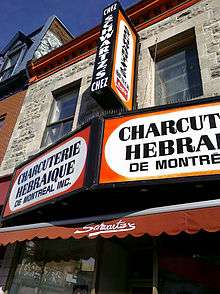Kosher style
Kosher style refers to foods commonly associated with Jewish people but which may or may not actually be kosher. It is a stylistic designation rather than one based on the laws of kashrut. Generally, kosher-style food does not include meat from forbidden animals, such as pigs and shellfish, and does not contain both meat and milk. In some U.S. states, the use of this term in advertising is illegal as a misleading term under consumer protection laws.[1]

Jews who do not keep kosher but wish to restrict themselves to eating "traditional style" foods, usually not eating forbidden animals or mixing milk and meat, may consider themselves to keep "kosher style."[2]
Kashrut law
Some dining establishments, notably delicatessens, serve kosher-style food. This usually means that they serve traditional Ashkenazic Jewish foods, such as bagels with lox, knishes, blintzes, matzo ball soup, and cold cut sandwiches, especially pastrami, corned beef, brisket and beef tongue.
Almost always, when a restaurant calls itself kosher style, the food is not actually kosher according to traditional halakhic (Jewish law) standards. The Reuben sandwich, which contains meat and cheese, is not kosher, nor is the Monte Cristo sandwich, made with ham and cheese. Dairy-based desserts such as cheesecake may be offered as complements to a meat dish. However, since fish is pareve (neither meat nor dairy), lox on a bagel spread with cream cheese may be kosher if the lox meets the requirements of kashrut.[3]
Several notable restaurants in Lower Manhattan fit into the kosher-style genre, including Katz's Delicatessen[4] and Russ & Daughters.[5] Canter's restaurant in Los Angeles and Montreal's Schwartz's deli also fall into this category.
Jews who adhere strictly to the laws of kashrut will not eat at kosher-style establishments. Furthermore, the fact that such establishments appear to be kosher can be deceptive to Jews who are visiting an unfamiliar city and looking for kosher food. Some of these establishments are also open on the Jewish sabbath for business when this is forbidden by halakha. Others may choose to eat at but not consume meat or cheese at such restaurants.
In Toronto, several kosher-style restaurants (e.g., Meyers, Shopsy's) now serve pork products, such as bacon, ham, ribs, and sausage, in order to serve a larger number of customers. Some kosher-style hotdog restaurants, such as Max's Famous Hotdogs and The Windmill, use pork as well as beef hot dogs.
References
- "General Laws". mass.gov.
- "Is "kosher style" good enough, as long as I don't mix milk and meat?". askmoses.com.
- "May fish be consumed with dairy? - Is lox and cream cheese kosher?". www.chabad.org. Retrieved 19 January 2020.
- "FAQs — Katz's Delicatessen - Shipped, Catered & Delivered". katzsdelicatessen.com.
- Andrew F. Smith, Garrett Oliver (2015). Savoring Gotham: A Food Lover's Companion to New York City. Oxford University Press. ISBN 9780190263645.
Some Jewish delicatessen served only kosher meat, but many were kosher style, meaning that they served meat not certified as kosher but did not serve dairy (to avoid mixing with meat) or any pork and shellfish products. With Jewish acculturation to the mainstream, however, the concept of "kosher-style" delicatessens broadened to include smoked meat sandwiches with slices of cheese or luscious New York-style cheesecakes for dessert - if not the occasional ham sandwich.